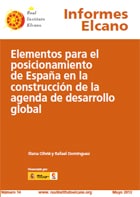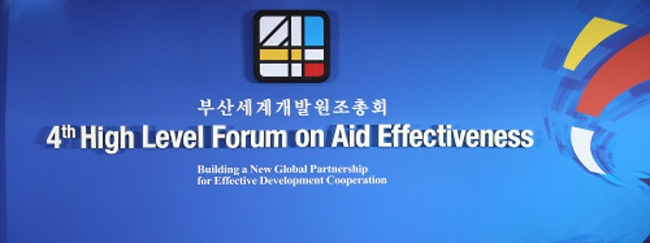‘The world has changed dramatically, so let’s do business as usual’. This is more or less what the HLP proposes in its report on the post-2015 development agenda. But make no mistake: this is not necessarily a flaw of the report. Eradicating extreme poverty, putting sustainable development at the core of the agenda, transforming economies for jobs and inclusive growth, building peace and effective institutions, and forging a new global partnership are still the most pressing development challenges, just as they were when the MDGs were approved in the previous decade.
Nevertheless, the problem with the report – and this is the first déjà vu of the original MDGs – is that not all the challenges have been translated into specific targets with equal emphasis. For instance, Annex I of the report primarily focuses on extreme poverty, food security, education and health – the second déjà vu – and not much on inclusive growth, income equality, international trade or development-oriented foreign direct investment – the third déjà vu. In fact, if I had to write my own assessment of the HLP report, I would rather pretty much copy-paste most of Claire Melamed’s insights on the issue in The Guardian.
Why is this so important? There is a tendency among development experts to regard inequality problems in developing countries as a matter of fiscal domestic policy, which is ultimately reflected in their reports (including in the HLP report). Milanovic, for instance, has demonstrated that inequality between countries is decreasing, whereas inequalities within countries are increasing. Therefore, the HLP report states: “We recognised that every country is wrestling with how to address income inequality, but felt that national policy in each country, not global goal-setting, must provide the answer”. Well, that is a risky argument. If this is how it goes, the same reasoning could apply to extreme poverty, gender inequality or hunger, as they all occur within national boundaries. Yet, I concur, as inequality also pertains to the way a country inserts itself within the global economy, the limitations posed by our global trade and financial system for development should be addressed as well – and these have not been touched upon as determinedly as they should have been in the report. Moreover, as argued elsewhere, inequality is not just a fiscal matter, but involves the whole structural setting of any economy. There are equal and unequal patterns of growth, and in the latter case, fiscal policy can do its best to counteract the effects of exclusive growth, but it cannot work miracles. If inequality rises before taxes and transfers, it will probably do so after taxes and transfers.
 In a report published recently by the Elcano Royal Institute, my colleague Rafael Domínguez and I argue that, despite huge spending cuts, Spain is currently in a good position to take a step forward from its traditional position and move towards concrete policy-making in the international arena. So far, Spain’s participation in the post-2015 agenda has been zero. The HLP has pretty much set the ground for what the post-MDG goals will be and has therefore narrowed the debate. Nonetheless, this does not imply that countries other than those that are represented in the Panel cannot contribute to the post-2015 debate. Although this is not the place to go any deeper into the Byzantine LDCs/MICs debate, it should be noted that today – unlike in the late 1990s – most of the world’s poorest live in MICs (see Andy Sumner’s works on this issue). Of course, this does not mean that aid efforts should concentrate on MICs rather than on LDCs. But it does imply that development efforts through aid or – most importantly – through broader development cooperation should include MICs and break the cliché of considering them a homogeneous group of rich, yet unequal countries with no political will to overcome internal disparities.
In a report published recently by the Elcano Royal Institute, my colleague Rafael Domínguez and I argue that, despite huge spending cuts, Spain is currently in a good position to take a step forward from its traditional position and move towards concrete policy-making in the international arena. So far, Spain’s participation in the post-2015 agenda has been zero. The HLP has pretty much set the ground for what the post-MDG goals will be and has therefore narrowed the debate. Nonetheless, this does not imply that countries other than those that are represented in the Panel cannot contribute to the post-2015 debate. Although this is not the place to go any deeper into the Byzantine LDCs/MICs debate, it should be noted that today – unlike in the late 1990s – most of the world’s poorest live in MICs (see Andy Sumner’s works on this issue). Of course, this does not mean that aid efforts should concentrate on MICs rather than on LDCs. But it does imply that development efforts through aid or – most importantly – through broader development cooperation should include MICs and break the cliché of considering them a homogeneous group of rich, yet unequal countries with no political will to overcome internal disparities.
In this sense, the Spanish Agency for International Development Cooperation – which celebrates its 25th anniversary this year – can provide strategic knowledge of working in middle-income environments in Latin America and North Africa. It could be said that the recent global changes – e.g. the shift of wealth from the North to the South and East, and of poverty from LICs to MICs – could make Spain the ‘post-Busan’ donor. In other words, a country involved in developing and emerging economies in more than one area of policy – development cooperation, trade, foreign direct investment and cultural relations by means of political dialogue and triangular cooperation – and functioning as a gateway for the EU to the global South. Yet, to truly realize this potential, it is mandatory to address the structural weaknesses of Spanish cooperation, including an incoherent approach to its external relations, a lack of human and technical domestic capacities in the cooperation system, a deficit of evaluation, and the lack of a clearly defined donor-profile and the institutional architecture that goes with it.
Thus, in essence, the post-2015 agenda should focus on a more holistic economic policy approach to tackling intra-country inequality and including MICs in broader development cooperation. In addition, in its role of ‘post-Busan’ donor, Spain could act as a strategic channel, providing know-how for collaboration with MICs in development.
(Originally posted at The Broker on 10 July 2013).



